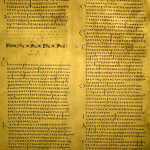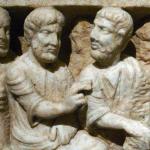In Buffalo, New York (which we down-staters sometimes forget is the same state!) on Friday, Bishop Richard J. Malone was installed. Friday was also the feast of St. Lawrence, the day after the feast of Edith Stein. In his homily, Bishop Malone took the opportunity to reflect on the martyrdom of the two and the call of the Christian life:
Back to the martyrs. There is a message here, for me and for all of us. A martyr is, after all, in the most literal sense a witness. And a witness is anyone whose discipleship is so authentic, so deep, so uncompromising, so credible that she or he is ready and willing, with God’s grace, to give all, surrender all, to Christ and the truth he has revealed … and to do so in the face of fear, loss, scorn, rejection, suffering, even death. It is total self-giving in response to Christ’s love poured out for us from the Cross.
For some, like Lawrence, the witness’s surrender rises to a dramatic climax, like death on a grill. For most of us, though, our witness is a matter of persevering commitment to Christ and the Gospel, a daily dying to self, again and again, in large things and small. And this can be attempted in a wholesome, healthy and life-giving way only with profound hope, and even, paradoxically, real joy. Is this not the heart of the Paschal Mystery … that from dying comes new and abundant life? Is this not the clear meaning of Jesus’ words to his disciples in John 12: “Amen, amen I say to you, unless the grain of wheat falls to the earth and dies, it remains just a grain of wheat; but if it dies, it produces much fruit.” And remember the context of this passage. It was early in Passion week. Jesus’ hour had come, and he was opening the eyes of his closest friends to the mystery of his impending redemptive death. Master teacher that He is, Jesus drew on an obvious fact from nature. A seed must die in the ground if it is to produce fruit. Not to die is to remain fruitless, unproductive … truly dead.
Christians are called do this in our daily lives, moment to moment — every one, every moment. Christ impacts the lives around us through us, if we let him. It is not only good for our own souls, and those in our immediate vicinity online and off, it has profound cultural implications. Bishop Malone continued:
This startling yet foundational teaching of Jesus is relevant not only for our own personal growth in holiness. No. There is more. This truth has profound meaning for our mission in this world, the mission best summed up in the word, “Evangelization,” which means, in the words of Pope Paul VI, “Bringing the Good News into all the strata of humanity, and through its influence, transforming humanity from within and making it new” (Evangelii Nuntiandi , 18).
Evangelization, the work of all the baptized, aims at the transformation of individuals in Christ, and the transformation of our increasingly secular culture into a civilization of love and a culture of life, respectful of human life from conception to natural death and at every moment in between; of marriage as the union of one man and one woman, open to new life; protective of religious liberty and conscience rights; compassionate toward the poor and toward immigrants, and so much more. We need the martyrs’ conviction, courage, tenacity and selflessness–and hope– to stand up in our increasingly relativistic society in defense of these truths and values so threatened in our time.
Blessed John Paul II and Pope Benedict XVI have called us to a New Evangelization … not a new message, but a new impetus, new zeal, urgency and methods, with a special focus on outreach to inactive Catholics. This call is a response to the Lord’s promise, as we heard in Ezechiel 34, to tend his sheep, where God says “The lost I will seek out.”
And so the shepherd challenged:
the grain that must fall to the earth and die if we are to give credible witness to Christ, to the truth. And so, the hard question for each of us: What must die in me, in you, for us to grow in holiness, and for the work of the new evangelization to bear good fruit? Could it be empty fear or hopelessness, cynicism, self-absorption, apathy or mediocrity? Perhaps doubt or distrust, bitterness, maybe guilt? Are we too comfy in our comfort zones?
What must go if our discipleship, our witness, our mission as Church is to be truly effective, drawing people to Christ–or back to Him, building up the community of faith, and correcting the compass of our culture to a more Godly course?
Our prayer must be — if we are to truly be who we say we are as Christians —
that we and all we meet would come to know who we are in Christ, and surrender our hearts to his love and our lives to his work in the world.
Bishop Malone offered the words of Blessed Charles de Foucauld as a help:
Father, I abandon myself into your hands. Do with me what you will. Whatever you may do, I thank you. I am ready for all. I accept all. Let
only your will be done in me and in all your creatures.I wish no more than this, O Lord. Into your hands I commend my soul. I offer it to you with all the love of my heart.
For I love you, Lord, and so need to give myself, to surrender myself into your hands, without reserve and with boundless confidence, for you are my Father. Amen.
The call to true holiness throughout our lives is not one for the particularly pious or brave — or bold to use an overused word of late — but to all. We are called to witness in ways big and small, all in unity with the body of Christ, made possible through Himself.
Radical, but that is what the Christian life is. If we’re not asking the questions Bishop Malone asked and praying prayers of abandonment daily, we’re not living it. Not only are we missing out on the best there is, we’re missing the meaning of it all.
Live with joy today! Bishop Malone recalled the words of a young Harvard law student on her Easter baptismal day:
“After the water was poured over me and the water in the pool stilled, I could see my face reflected in the water in the light of the great candle. And I thought, ‘Now, for the first time, in Jesus Christ, I know who I truly am.’”
May we live in that liberating knowledge today, in the Eucharist, “the very heartbeat of our Catholic lives.”

















